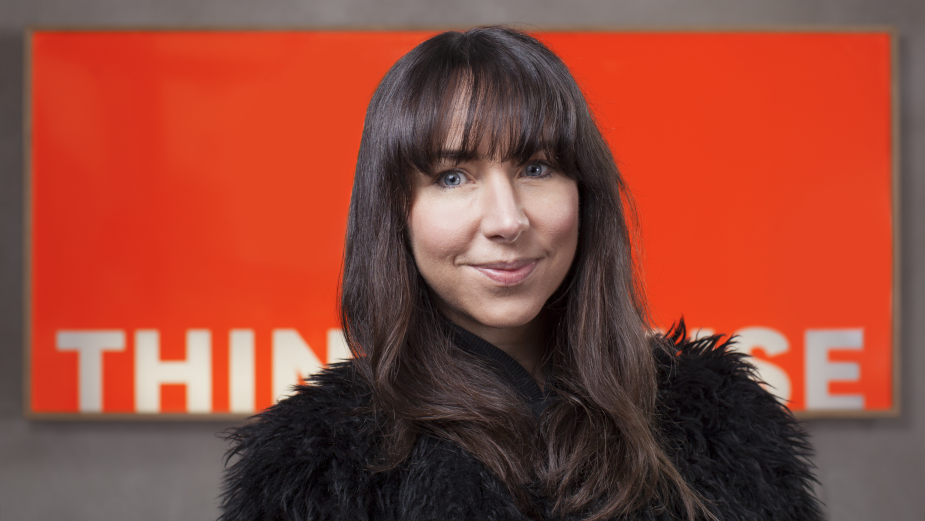
Bossing It: Finding the Right Pace with Jane McDaid

Jane McDaid founded THINKHOUSE 21 years ago, identifying a need for more culturally-led communications in the marketplace. She is a seasoned marketer who shapes the work of major brands. Through a relentless focus on creative innovation and cultural relevance Thinkhouse works with global and domestic brands to help them better understand, and connect, with younger generations through three key services: FAME, TRANSFORMATION and PLANET.
Jane was listed as one of the ‘Innovator25,’ a Holmes Report list of marketing communication leaders in EMEA that are ‘reshaping influence and engagement in an era of dramatic marketing and communications disruption.’
Jane’s unapologetic style, and vision, sets her apart from traditional marketeers. She embraces a disruptive outlook on industry traditions such as awards, agency structures and workplace culture and she advocates for positive change within the marketing industry.
Over the last number of years, McDaid has been one of the leading authorities on sustainable action in marketing through her agency's involvement in Purpose Disruptors (UK, Irl) thenetworkone's Sustainable Development Group as well as the agency's own reports, events and activities such as 'Earth Day - Delay is the New Denial' and 'World War Z'. THINKHOUSE’s always-on training and development PLANET programme; alongside its Friday for Futures sessions combine with external training (with Purpose Disruptors, AdGreen, The Cambridge Institute for Sustainability Leadership, and TU Dublin) to ensure sustainable training and practice is embedded across the organisation, avoiding the risk of isolated awareness and inaction.
LBB> What was your first experience of leadership?
Jane> I used to sell tea & toast from my Mum’s sitting room window - does that count? I also used to paint stones, varnish them, make leather and silver straps, attach them and sell these stone necklaces to fellow-students in my school - I had a few friends that were industrious alongside me. I also used to charge people for decorating their Doctor Martens… All those things took leadership - stepping outside of my comfort zone, flogging something I believed in, and creating a service that was useful, creative and one that people talked about!
LBB> How did you figure out what kind of leader you wanted to be – or what kind of leader you didn’t want to be?
Jane> Before becoming a leader, I didn't sit down and think “what kind of leader do I want to be?” I was much more focused on what I wanted to do, what kind of people/brands I wanted to do it with and how I wanted us to do it. I always wanted to bring fun, drama and scale to everything - and always want people to feel supported, empowered and excited to take creative risks. It’s important to laugh at the wild, audacious ideas and then, alongside amazing people, bring those wild ideas to life.
In terms of leadership - I like to gamify things where possible. I always believe that life’s too short to be too serious, so turning tasks into games can make them more fun.
I like to ensure everyone understands the desired outcome (of the company or the project) and their role in achieving that. Overall - I think more about how I can serve my team rather than how I can ‘lead’ my team.
LBB> What experience or moment gave you your biggest lesson in leadership?
Jane> Over a decade ago, I got sick. I was out for a few months and I learnt, from that experience, that I needed to let go more. I needed to empower my (brilliant) team to lead more and I needed to ensure I was more efficient and effective with my own time. That was my biggest lesson in leadership.
LBB> Did you know you always wanted to take on a leadership role? If so how did you work towards it and if not, when did you start realising that you had it in you?
Jane> From the earliest age, I always wanted to make things happen with ambitious, curious and fun people. I set up THINKHOUSE when I was just 26 - I didn’t ever have a fear of failure - I really had very little to lose.
LBB> When it comes to 'leadership' as a skill, how much do you think is a natural part of personality, how much can be taught and learned?
Jane> I think everything can be learned. But I do see natural leadership traits in people and these tend to be the people that develop quickly. Others work at it, and get there their own way, in their own time.
LBB> What are the aspects of leadership that you find most personally challenging? And how do you work through them?
Jane> Everything I do, I give it 100%. I have a sense of urgency and pace that can be challenging for other people to be around. I do find ‘slowing down’ challenging - but I genuinely have focused on that. I try to ensure that my pace is right for everyone, and the company, and that we’re moving, learning and growing at a pace that won’t burn anyone out. I think it’s a really important thing to prioritise.
LBB> Have you ever felt like you've failed whilst in charge? How did you address the issue and what did you learn from it?
Jane> It depends on what ‘failure’ is defined by. Have I lost opportunities? Have I made bad decisions? Of course - many things have not gone according to plan, but I am super comfortable with that. I would always be very open about the things that I’ve personally failed at and I’ll always apologise if I think I’ve let someone down. That’s not just about being a good leader, it’s about being human.
LBB> In terms of leadership and openness, what’s your approach there? Do you think it’s important to be transparent as possible in the service of being authentic? Or is there a value in being careful and considered?
Jane> Yes - I think it’s really important to be open, transparent and authentic. Over time, as our company has grown, I’ve learned to become much more considered - seeking alternate views and opinions of my valued colleagues. This ultimately strengthens inclusivity, decision-making and outcomes.
LBB> As you developed your leadership skills did you have a mentor, if so who were/are they and what have you learned? And on the flip side, do you mentor any aspiring leaders and how do you approach that relationship?
Jane> I was very young when I set up my business so I didn’t really have a mentor. However, throughout my career I’ve always had people I trust and admire - colleagues, clients, friends and family. I benefit from their skills, knowledge and experience so I guess, this is a form of mentorship. I try to be a good mentor to my team. I work hard to ensure that I am approachable, non-judgemental and useful - and that I give people the space to grow, learn and develop in their own way, at their own pace.
LBB> It's been a really challenging year - and that's an understatement. How do you cope with the responsibility of leading a team through such difficult waters?
Jane> Whilst covid was challenging - I actually enjoyed the really tough, early days. Yes, it was an enormous responsibility but right there and then - it didn’t feel like that. I felt like a challenge that could only be overcome by being the very best version of ourselves. I knew there’d be winners and losers and I was in no doubt whatsoever that I was surrounded by winners. That’s how I coped.
LBB> This year has seen the industry confronted with its lack of action/progress on diversity and inclusion. As a leader how have you dealt with this?
Jane> We have an active and always-on focus on diversity and inclusion and ensure that we are trained, literate and aware of our biases and blind spots - not just in how our organisation is managed and run, but in how our work and suppliers are managed too. Diversity & Inclusion forms a part of our twice weekly meetings, our internship programme, our recruitment process and our ‘Fit To Win’ training programme. We also measure our diversity and inclusion so that our team can share areas for improvement which, as a leader, reassures us all that we’re on the right track.
LBB> How important is your company culture to the success of your business? And how have you managed to keep it alive with staff working remotely in 2020?
Jane> Culture is everything. We have always focused on creating a culture that allows people to thrive, have fun and be their authentic selves in the workplace. We kept it alive, as best we could, during Covid by meeting remotely regularly and outdoors once the restrictions allowed. We had good, open dialogue regarding how everyone was feeling and what challenges people were facing. We also drove a major training & development programme - ensuring that we were providing space where people could grow and develop.
LBB> What are the most useful resources you’ve found to help you along your leadership journey?
Jane> I allocate a lot of time to personal upskilling and learning.. Of course - my team-mates, clients and industry colleagues are always inspiring and help me along my journey. All of the memberships I’m part of offer great resources in terms of training and development - thenetworkone; IAPI; PRCA, The Marketing Society, Purpose Disruptors, Creatives for Climate etc.. Events and Content on Zoom, YouTube; LinkedIn; Instagram are my go-to for learning about culture, tech and marketing. I devour books too - and love how they allow me to go deep into various different realms, worlds and beliefs - exploring things wholly. Finally, and most importantly, nature. Nature revitalises, energises and heals. It’s a daily reminder of the closest thing to perfect..













